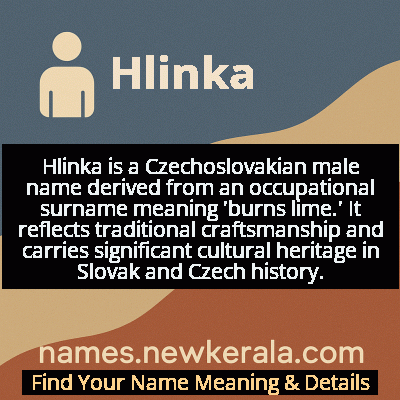Hlinka Name Meaning & Details
Origin, Popularity, Numerology Analysis & Name Meaning of Hlinka
Discover the origin, meaning, and cultural significance of the name HLINKA. Delve into its historical roots and explore the lasting impact it has had on communities and traditions.
Name
Hlinka
Gender
Male
Origin
Czechoslovakian
Lucky Number
1
Meaning of the Name - Hlinka
Hlinka is a Czechoslovakian male name derived from an occupational surname meaning 'burns lime.' It reflects traditional craftsmanship and carries significant cultural heritage in Slovak and Czech history.
Hlinka - Complete Numerology Analysis
Your Numerology Number
Based on Pythagorean Numerology System
Ruling Planet
Sun
Positive Nature
Leaders, ambitious, highly driven, self-reliant, innovative.
Negative Traits
Overly aggressive, domineering, impatient, selfish.
Lucky Colours
Red, orange, gold.
Lucky Days
Sunday.
Lucky Stones
Ruby, garnet.
Harmony Numbers
2, 3, 9.
Best Suited Professions
Entrepreneurs, managers, engineers.
What People Like About You
Courage, determination, leadership.
Famous People Named Hlinka
Andrej Hlinka
Catholic priest and politician
Founder of the Slovak People's Party and prominent Slovak nationalist leader
Jozef Hlinka
Musician and composer
Renowned Slovak pianist and conductor, founder of the Slovak Sinfonietta
Milan Hlinka
Ice hockey player
Czech ice hockey forward, Olympic gold medalist and World Championship winner
Ivan Hlinka
Ice hockey player and coach
Czech ice hockey legend, Olympic gold medalist and NHL coach
Name Variations & International Equivalents
Click on blue names to explore their detailed meanings. Gray names with will be available soon.
Cultural & Historical Significance
During the interwar period and World War II, the name became politically charged through the Hlinka Guard and associated movements, creating a multifaceted legacy that continues to influence contemporary perceptions. The name represents both the struggle for Slovak self-determination and the complicated political history of 20th century Central Europe. In modern times, while the political associations remain part of its history, the name has also gained positive recognition through sports figures and cultural contributors, creating a more balanced cultural significance that acknowledges both its historical weight and contemporary relevance in Slovak and Czech societies.
Extended Personality Analysis
Individuals with the name Hlinka are typically associated with strong, determined personalities marked by practical intelligence and deep cultural connections. The occupational roots in lime burning suggest methodical, industrious characteristics—people who approach challenges with systematic problem-solving and endurance. There's often an inherent resilience, mirroring the transformative process of turning raw limestone into useful lime through sustained heat and effort. This metaphorical transformation indicates individuals capable of enduring difficulties and emerging stronger, with an ability to create fundamental change in their environments.
Historically, prominent bearers of the name have demonstrated leadership qualities, political conviction, and fierce dedication to their principles. The name carries connotations of traditional values, community orientation, and sometimes stubborn determination when pursuing important goals. There's often a balance between innovation and preservation—the creativity to build new structures (symbolized by lime's use in construction) combined with respect for tradition and cultural heritage. This creates personalities that are both grounded in their roots and capable of driving meaningful progress, making them natural leaders and community pillars who value both stability and necessary transformation.
Modern Usage & Popularity
In contemporary usage, Hlinka remains predominantly a surname rather than a given name, with its strongest presence in Slovakia and the Czech Republic. While the name maintains moderate frequency in these regions, its complex political associations from the 20th century have led some families to be cautious about its use. However, among Slovak diaspora communities in North America, Western Europe, and Australia, the name continues to serve as an important marker of cultural heritage and identity. Recent decades have seen a positive resurgence of the name's recognition through sports figures, particularly ice hockey players who have achieved international success, helping to balance the historical political connotations with contemporary athletic achievement. The name appears occasionally as a given name in traditional families honoring ancestral connections, but more commonly persists as a surname carrying significant historical weight and regional identity, with modern bearers often navigating both the pride and complexity of their name's legacy.
Symbolic & Spiritual Meanings
Symbolically, Hlinka embodies the powerful themes of transformation and foundation-building, drawing from both its literal meaning in lime production and its historical significance in Slovak culture. The process of burning limestone to create lime represents purification and fundamental change through adversity—symbolizing resilience, endurance, and the ability to transform challenges into opportunities for growth and creation. As lime serves as a crucial building material, the name carries connotations of strength, permanence, and the construction of lasting structures, both physical and metaphorical. Historically, the name symbolizes deep cultural identity, political conviction, and the ongoing struggle for self-determination and preservation of heritage. It represents the dual nature of being both a creator—building new foundations and opportunities—and a preserver—maintaining cultural traditions and values. This rich symbolic tapestry makes Hlinka a name associated with enduring legacy, cultural continuity, and the transformative power of determined effort.

